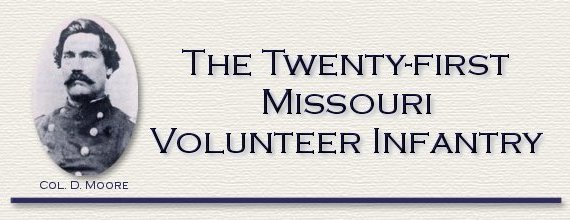 HOME HOME
 Documents Documents  Rugh Docs Rugh Docs
|

Henry K. Rugh of Company I
Kindly donated to this site by Anita
THE ILLUSTRIOUS 21ST MISSOURI AT SHILOH
MEN TAKEN PRISONER
Editor, National Tribune: My regiment, the 21st Missouri, was formed by the consolidation of two
battalions raised in the northeastern part of the state in the summer of 1861.
Our first real fight was at Shiloh. There we took part in the
reconnaissance sent out by General Prentiss which opened the battle.
During the first day at Shiloh, the regiment occupied a prominent place
in the line, which it held with such tenacity that it only fell back when
ordered to do so.
We went out on the firing line that morning but there were such
overwhelming forces that the regiment was scattered.
Our Colonel Moore was taken off the field with a shattered leg that was
afterward taken off.
Our Lieutenant Colonel was left in command of the regiment. Our Major
was killed and our adjutant was taken prisoner and died in prison later. My
Company lost four men and several wounded.
That was the formation of our Regiment and I saw no more of my Company
that day. I was with the 16th Wisconsin for a part of the time.
About 5 o'clock a courier was sent to General Prentiss with a dispatch
ordering him to fall back, as he was being surrounded, but Prentiss did not
get it. The Aide was either killed, captured or got lost.
About 2,200 of us consequently were captured. We camped as prisoners
near the battlefield and it rained very hard all night. We had no protection
from the storm. No blankets or covering of any kind.
The next day, we were marched to Corinth. There they gave us some
crackers and pickled beef. We called it "mule meat" because it was so tough.
Then we were put into a box car, six to a car, and taken to Mobile by way
of Memphis. We remained there only a few days, were separated into squads
and sent to different prisons.
The "bunch" I was with was sent to Tuscaloosa, Alabama.
Tuscaloosa is at the "head of navigation" on the Black Warrior River.
Boats do not go any further.
We were quartered in buildings on both sides of the street in town.
The upper stories were used as prisons and guards were placed on both
sides of the street.
The guards on the opposite side of the street could fire into our
windows. We were not allowed to look out of the windows under penalty of
death. That meant just that. One man was killed in the room next to the one
I was in the second day we were there.
I stepped close enough to the window, the sentry saw me, and a load of
shot went into the window casing about three feet above my head. That cured
me.
There were twenty men in the room I was in.
They brought us one pan of corn bread a day for our rations. We
appointed one man to divide it. He cut it into twenty shares, three by three
inches. Some black-eyed peas seasoned with a very small piece of meat and
sometimes a small portion of black molasses. We ate all we got at one meal.
All the exercise we got was when we were allowed (about once in three
days) to go after water to a spring, a quarter of a mile from our quarters,
under guard. Quite a lot of citizens would tag along.
We were objects of utmost curiosity to the natives. Many of them had
never seen Yanks before.
We were in prison forth-six days, then we were taken to Montgomery,
Alabama, where we were paroled.
We were sent to Benton Barracks in St. Louis and kept there in parole
camp about eight months before we were exchanged and sent to our different
regiments.
I re-enlisted and served till the end of the war (nearly five years).
I am eighty-two years old now and one of only nine of my company still
living.
Corporal Henry K. Rugh
21st Missouri,
Memphis
| This letter was written by Henry Rugh two years before his death and was
published in the National Tribune newspaper of Memphis, Mo., on Feb. 12, 1925 |  The information on this web site is for your personal use only. All pages, files, compilations, transcriptions, abstracts, and scanned images are protected by copyright law and may not be copied in whole or in part and published or redistributed in any manner without written consent of the author, contributor and/or webmaster.  Copyright © 1999-2003 Brenda Schnurrer . All rights reserved.
|

![]()